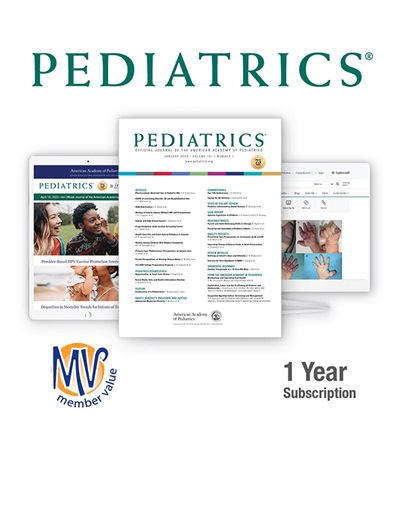Transparent Reporting of Pediatric Clinical Trial Interventions: TIDieR-Children and Adolescents.
IF 6.4
2区 医学
Q1 PEDIATRICS
引用次数: 0
Abstract
Pediatric randomized controlled trials (RCTs) inform decisions concerning the choice of interventions in children and adolescents. To enable the implementation of effective interventions, RCT reports need to provide adequate details on the elements, infrastructure, and delivery of these interventions. Using the 12-item Template for the Intervention Description and Replication (TIDieR) framework, an international team developed guidance for comprehensive reporting of trial interventions in pediatric RCT protocols and reports. We (1) identified initial pediatric considerations (PCs) and examples of good reporting using 50 recent pediatric RCT reports, (2) held an expert panel meeting, (3) conducted a Family Caregiver Workshop to discuss and get input on PCs, (4) compiled PCs and examples of good reporting, and (5) achieved consensus on final PCs and examples. Thirteen PCs reached consensus; they address how trial intervention materials were appropriate for the age and developmental stage of trial participants, which adjustments to enhance palatability of medications and acceptability of interventions were implemented, and how pediatric-specific dosing was determined. Consensus was also reached on accompanying good reporting exemplars. Presenting a minimum set of considerations pertinent to pediatric trial interventions, the TIDieR-Child & Adolescent Health (TIDieR-C) checklist can help trial authors and evidence end users comprehensively report and appraise tested interventions. It can be used with the pediatric-specific extensions of the Standard Protocol Items for Randomized Trials (SPIRIT) and Consolidated Standards of Reporting Trials (CONSORT): SPIRIT-Children & Adolescents and CONSORT-Children & Adolescents. Uptake of this guidance may lead to improved understanding, replicability, and implementation fidelity of effective trial interventions.儿科临床试验干预的透明报告:tidier -儿童和青少年。
儿科随机对照试验(RCTs)为儿童和青少年干预措施的选择提供决策依据。为了能够实施有效的干预措施,随机对照试验报告需要提供有关这些干预措施的要素、基础设施和交付的充分细节。利用干预措施描述和复制的12项模板(TIDieR)框架,一个国际团队制定了儿科RCT方案和报告中综合报告试验干预措施的指南。我们(1)通过最近的50份儿科RCT报告确定了初步儿科考虑因素(PCs)和良好报告示例,(2)召开了专家小组会议,(3)举办了家庭照顾者研讨会,讨论并获得PCs的意见,(4)汇编PCs和良好报告示例,(5)就最终PCs和示例达成共识。十三名委员达成共识;他们讨论了试验干预材料如何适合试验参与者的年龄和发育阶段,如何进行调整以增强药物的适口性和干预措施的可接受性,以及如何确定儿科特定剂量。还就附带的良好报告范例达成了协商一致意见。tidier -儿童与青少年健康(TIDieR-C)检查表提供了与儿科试验干预措施相关的最低考虑因素,可以帮助试验作者和证据最终用户全面报告和评估测试的干预措施。它可以与随机试验标准方案项目(SPIRIT)和综合试验报告标准(CONSORT)的儿科特定扩展一起使用:SPIRIT-儿童与青少年和CONSORT-儿童与青少年。采纳本指南可提高对有效试验干预措施的理解、可复制性和实施保真度。
本文章由计算机程序翻译,如有差异,请以英文原文为准。
求助全文
约1分钟内获得全文
求助全文
来源期刊

Pediatrics
医学-小儿科
CiteScore
12.80
自引率
5.00%
发文量
791
审稿时长
2-3 weeks
期刊介绍:
The Pediatrics® journal is the official flagship journal of the American Academy of Pediatrics (AAP). It is widely cited in the field of pediatric medicine and is recognized as the leading journal in the field.
The journal publishes original research and evidence-based articles, which provide authoritative information to help readers stay up-to-date with the latest developments in pediatric medicine. The content is peer-reviewed and undergoes rigorous evaluation to ensure its quality and reliability.
Pediatrics also serves as a valuable resource for conducting new research studies and supporting education and training activities in the field of pediatrics. It aims to enhance the quality of pediatric outpatient and inpatient care by disseminating valuable knowledge and insights.
As of 2023, Pediatrics has an impressive Journal Impact Factor (IF) Score of 8.0. The IF is a measure of a journal's influence and importance in the scientific community, with higher scores indicating a greater impact. This score reflects the significance and reach of the research published in Pediatrics, further establishing its prominence in the field of pediatric medicine.
 求助内容:
求助内容: 应助结果提醒方式:
应助结果提醒方式:


